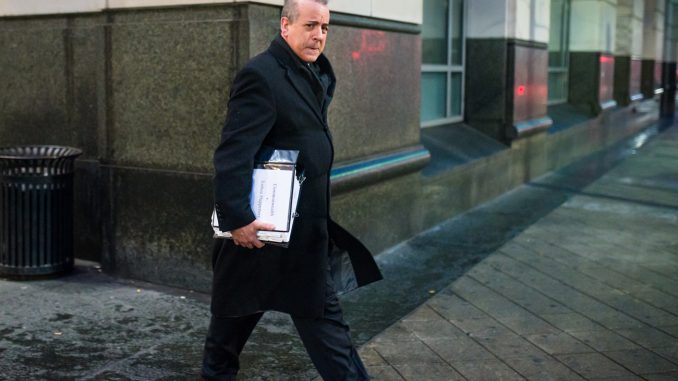
Twelve jurors and four alternates were chosen on Monday to serve during Joshua Hupperterz’s murder trial, which will begin on Tuesday.
Seven male and five female jurors will decide Hupperterz’s conviction. Six jurors are white, four are Black and two are Asian. The four alternates are three Black men and one Black woman.
Hupperterz is charged with the murder of first-year transfer student Jenna Burleigh, who was killed in August 2017. Hupperterz denied a guilty plea deal on Dec. 3, 2018 that would have sentenced him 30 to 60 years in prison. If convicted of first- or second-degree murder, Hupperterz could face a life sentence.
He is also charged with abuse of corpse and tampering with evidence, which Hupperterz will admit to if it comes up in trial, Hupperterz’s defense attorney David Nenner said.
Hupperterz appeared in court on Monday, wearing a light gray suit, blue shirt and a boot on his right foot. He was quiet during the day and only spoke to Nenner during the jury selection.
Assistant District Attorneys Jason Grenell and Danielle Burkavage, along with Nenner, selected jurors and alternates for seven hours on Monday at the Juanita Kidd Stout Center for Criminal Justice.
Defense and prosecutors also filed several pre-trial motions Monday, including one to dismiss Hupperterz’s drug-related charges. Philadelphia Court of Common Pleas Judge Glenn Bronson said the charges were “irrelevant” to the case.
Nenner objected to prosecutors using several close-up photos of Burleigh’s face from after she was killed as evidence, as well as photos of her body in the bin that Hupperterz allegedly used to transport her corpse.
Photos of Burleigh’s face will be permitted as evidence, and the bin photos will be allowed if Hupperterz’s abuse of corpse charge is brought up during trial.
Burleigh’s parents, Ed and Jacqui, attended the hearing on Monday, and Hupperterz’s mother, Gina, attended.
While selecting jurors, Nenner argued the prosecution excluded individuals based on race and raised that four of the five jurors that prosecutors dismissed were Black. Grenell argued that the jurors’ dismissals were race-neutral.
The case has a racial aspect because Hupperterz is multiracial, Nenner said. Hupperterz is half-Hispanic, one quarter Black and one quarter white.
Bronson denied Nenner’s challenge. The trial does not appear to have a racial aspect because Hupperterz “appears white” and Burleigh was white, Bronson said.
One potential juror said he is a Temple professor and that Burleigh’s murder profoundly impacted the university community. He was excused after explaining he spoke to several “young” and “female” students who felt “fear and sorrow” about her killing.
Another potential juror said her “spirit was shaken” by seeing Hupperterz in court and the serious nature of the crime.
Jurors will likely hear testimony from several witnesses about events leading up to and following Burleigh’s murder. Ed Burleigh, Hupperterz’s cousin, Erik Carlson and DNA experts were witnesses mentioned by council on Monday.
Burleigh met Hupperterz on Aug. 30, 2017 at Pub Webb, a bar on Cecil B. Moore Avenue near 16th Street. Security footage shows Burleigh leaving the bar with Hupperterz around 2 a.m. on Aug. 31, 2017 and walking toward his apartment on 16th Street near Cecil B. Moore Avenue, where police believe she was killed.
Burleigh’s body was transported in a plastic storage bin from Hupperterz’s apartment to his mother’s home in Jenkintown, Pennsylvania, where it remained overnight.
The next day, Hupperterz allegedly used the car service Lyft for a ride from his mother’s to his grandmother’s Wayne County property, where Burleigh’s body was found in a shed.
Police searched Hupperterz’s apartment, where they found blood on several surfaces, 10 to 15 pillow case-sized bags of marijuana and $20,000 in cash.
Bronson is set to hear opening arguments on Tuesday morning at 9 a.m.


Be the first to comment